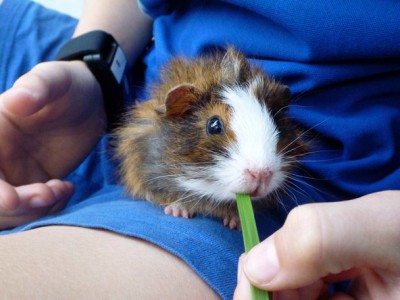A new study from Australia measured physiological arousal in children with and without ASD in the context of different peer group situations. Small groups of three children (one with ASD and two with typical development) wore wrist bands to measure skin conductance during four peer group activities: reading silently, reading aloud, free play with toys, and free play with guinea pigs. The children with ASD showed: (1) reduced levels of arousal during play with guinea pigs compared to the other activities, and (2) reduced levels of arousal during play with guinea pigs compared to their peers. In fact, arousal levels of the children with typical development increased during play with guinea pigs relative to the other activities.
The different patterns of response to the guinea pig activity in children with and without ASD may be explained by the fact that physiological arousal can reflect either stress or excitement. The authors propose that for children with ASD, the presence of the guinea pigs within a social context may serve as a buffer against the anxiety and stress induced by social situations. On the other hand, for children without ASD, who are more comfortable in social situations, increased arousal in the guinea pig condition may reflect increased excitement in response to the novel situation.
While the presence of guinea pigs should not be considered a therapeutic intervention in and of itself, it may be useful in reducing social anxiety in children with ASD, and provide a more comfortable context for interacting with and learning from peers.
To learn more about the study, read The New York Times’ article Guinea Pigs Are Autistic Child’s Best Friend.
